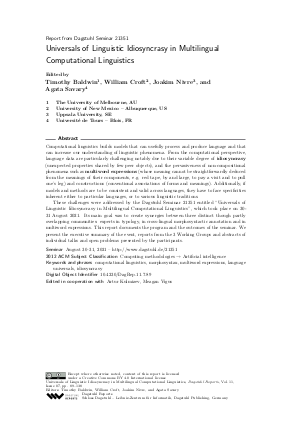Universals of Linguistic Idiosyncrasy in Multilingual Computational Linguistics (Dagstuhl Seminar 21351)
Authors Timothy Baldwin, William Croft, Joakim Nivre, Agata Savary and all authors of the abstracts in this report
-
Part of:
Issue:
Dagstuhl Reports, Volume 11, Issue 7
Part of: Volume: Dagstuhl Reports, Volume 11
Part of: Journal: Dagstuhl Reports (DagRep) - License:
 Creative Commons Attribution 4.0 International license
Creative Commons Attribution 4.0 International license
- Publication Date: 2021-12-22
File

PDF
DagRep.11.7.89.pdf
- Filesize: 1.85 MB
- 50 pages
Document Identifiers
Subject Classification
ACM Subject Classification
- Computing methodologies → Artificial intelligence
Keywords
- computational linguistics
- morphosyntax
- multiword expressions
- language universals
- idiosyncrasy
Metrics
- Access Statistics
-
Total Accesses (updated on a weekly basis)
0Document
0Metadata
Abstract
Computational linguistics builds models that can usefully process and produce language and that can increase our understanding of linguistic phenomena. From the computational perspective, language data are particularly challenging notably due to their variable degree of idiosyncrasy (unexpected properties shared by few peer objects), and the pervasiveness of non-compositional phenomena such as multiword expressions (whose meaning cannot be straightforwardly deduced from the meanings of their components, e.g. red tape, by and large, to pay a visit and to pull one’s leg) and constructions (conventional associations of forms and meanings). Additionally, if models and methods are to be consistent and valid across languages, they have to face specificities inherent either to particular languages, or to various linguistic traditions. These challenges were addressed by the Dagstuhl Seminar 21351 entitled "Universals of Linguistic Idiosyncrasy in Multilingual Computational Linguistics", which took place on 30-31 August 2021. Its main goal was to create synergies between three distinct though partly overlapping communities: experts in typology, in cross-lingual morphosyntactic annotation and in multiword expressions. This report documents the program and the outcomes of the seminar. We present the executive summary of the event, reports from the 3 Working Groups and abstracts of individual talks and open problems presented by the participants.
Cite As Get BibTex
Timothy Baldwin, William Croft, Joakim Nivre, and Agata Savary. Universals of Linguistic Idiosyncrasy in Multilingual Computational Linguistics (Dagstuhl Seminar 21351). In Dagstuhl Reports, Volume 11, Issue 7, pp. 89-138, Schloss Dagstuhl – Leibniz-Zentrum für Informatik (2021)
https://doi.org/10.4230/DagRep.11.7.89
BibTex
@Article{baldwin_et_al:DagRep.11.7.89,
author = {Baldwin, Timothy and Croft, William and Nivre, Joakim and Savary, Agata},
title = {{Universals of Linguistic Idiosyncrasy in Multilingual Computational Linguistics (Dagstuhl Seminar 21351)}},
pages = {89--138},
journal = {Dagstuhl Reports},
ISSN = {2192-5283},
year = {2021},
volume = {11},
number = {7},
editor = {Baldwin, Timothy and Croft, William and Nivre, Joakim and Savary, Agata},
publisher = {Schloss Dagstuhl -- Leibniz-Zentrum f{\"u}r Informatik},
address = {Dagstuhl, Germany},
URL = {https://drops.dagstuhl.de/entities/document/10.4230/DagRep.11.7.89},
URN = {urn:nbn:de:0030-drops-155911},
doi = {10.4230/DagRep.11.7.89},
annote = {Keywords: computational linguistics, morphosyntax, multiword expressions, language universals, idiosyncrasy}
}
